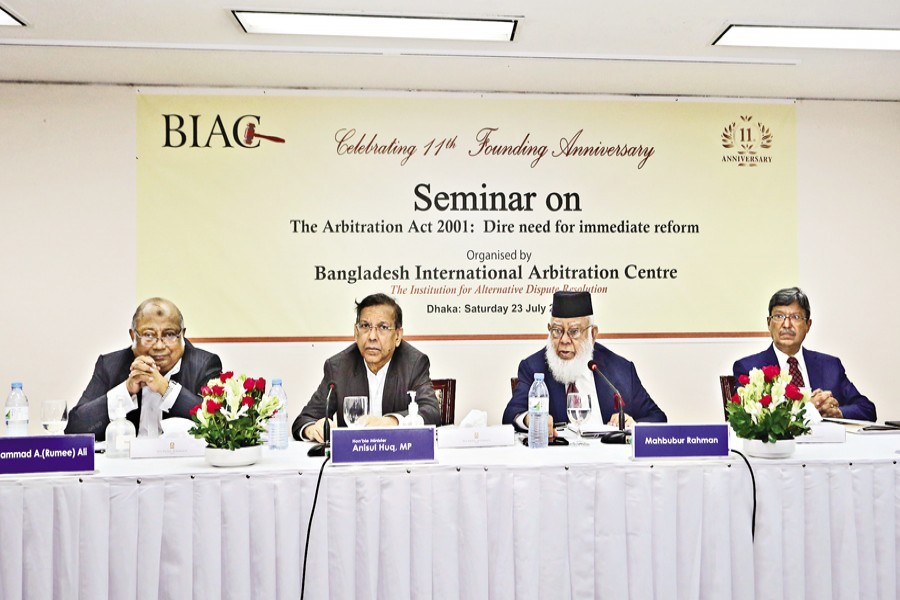Amending the loose-knit Arbitration Act 2001 is urgent for promoting investment and job generation commensurate with a higher-grade economic status of Bangladesh, experts say as they find the law dilatory.
It is not cost-effective and time-saving, they said at a meet Saturday and urged the government to urgently bring necessary reform in the act incorporating mandatory time limit and fast-track mechanism for arbitration proceedings.
They said the possible changes to the act is crucial for not only settling commercial disputes but also alluring global investors into Bangladesh which is rated one of the worst performers in the area of enforcing contract in the World Bank's ease-of-doing-business index.

By doing so, the economy, which aspires to be a developed one by 2041, can create required jobs through enhancing the ratio of private investment to GDP (gross domestic product), they noted.
The call and observations were made at a seminar on The Arbitration Act 2001: dire need for immediate reform. Celebrating its 11th founding anniversary, Bangladesh International Arbitration Centre (BIAC) hosted the discussion where minister for law, justice and parliamentary affairs Anisul Huq was present as the chief guest.
BIAC chairman and president of the International Chamber of Commerce-Bangladesh Mahbubur Rahman chaired the function.
Terming effective ADR or alternative dispute-resolution mechanism a key for businesses, Mr Rahman said around 90 per cent of the commercial disputes are settled outside courts in the United Kingdom.
"We need to popularise the ADR system here in the same way. I believe that the government is very positive and proactive in bringing reform in the existing act, but we're yet to achieve the target. Without reform, it will not be possible to get the desired outcomes," he added.
In a keynote presentation, Barrister Rashed Imam, partner of Akhtar Imam and Associates, said there is no mandatory time limit for disposing of an application challenging an award in the existing act, resulting in monumental delays.
"I propose to include a statutory time limit of 6 months or 12 months for disposal of an application challenging an award like the way India has done it."
He called upon the policymakers to bring changes in the law inserting a provision of fast-track arbitration for enforcement of arbitral awards.
Citing the latest WB ease-of-doing-business report 2020, he said Bangladesh's position was 189 among the 190 countries in the area of enforcement of commercial contracts.
He points out that there are 3.9 million cases pending with the courts, which are struggling. "I am hopeful and optimistic that in the near future the legislators will amend the existing act to create a robust legal framework for arbitration here."
Giving data over time required for resolving disputes in Bangladesh and its regional competitors, chairman and CEO of Policy Exchange Bangladesh Dr M. Masrur Reaz said Bangladesh on average needs 1442 days for resolving a dispute whereas dispute resolution takes 1100 days, 400 days and 390 days in South Asia, Vietnam and Indonesia respectively.
The percentage of claimed amount that gets spent into dispute- resolution process is 66 per cent in Bangladesh, which is much higher than that of South Asia (29 per cent), Vietnam (29 per cent) and East Asia (over 40 per cent), according to him.
"That's why it is important to reform the existing act," he adds.
President of Metropolitan Chamber of Commerce and Industry, Dhaka, Md. Saiful Islam said there is no other alternative but to go for legal battle whenever the businesses find that there is a breach of contract. "But going into legal battle is an endless journey. It costs time, it costs money. Sometimes it is never- ending, but we cannot give it up, looking for the win," he said.
"The act needs to be amended. Without having that, we cannot improve our ease of doing business," he added.
Speaking as chief guest, law minister Anisul Huq said the theme of discussion is very relevant under the prevailing circumstances.
"I wish to assure the audience that the recommendations of the seminar shall be taken up to bring about desired fruitful change in the near future," he said.
He also appreciated the BIAC for its outstanding support in the area of ADR.
BIAC vice-chairman Muhammad A. (Rumee) Ali, BIAC CEO Kaiser A. Chowdhury, Chairman of Association of Bankers (ABB) Selim R. F. Hussain Rahman, former judge of the Supreme Court Justice Abdus Salam Mamun and senior partner of A Hossain and Associates Barrister Ajmalul Hossain also spoke at the event.


